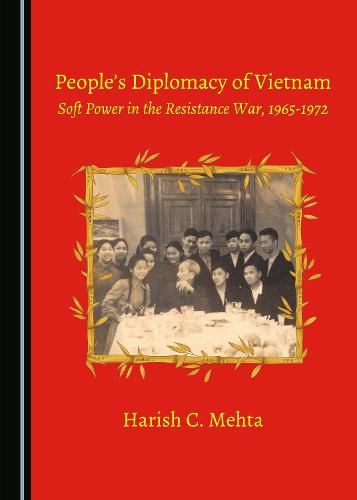Readings Newsletter
Become a Readings Member to make your shopping experience even easier.
Sign in or sign up for free!
You’re not far away from qualifying for FREE standard shipping within Australia
You’ve qualified for FREE standard shipping within Australia
The cart is loading…






This is the first full-length book on the concept of People’s Diplomacy, promoted by the president of North Vietnam, Ho Chi Minh, at the peak of the Vietnam War from 1965-1972. It holds great appeal for historians, international relations scholars, diplomats, and the general reader interested in Vietnam. A form of informal diplomacy, people’s diplomacy was carried out by ordinary Vietnamese including writers, cartoonists, workers, women, students, filmmakers, medical doctors, academics, and sportspersons. They created an awareness of the American bombardment of innocent Vietnamese civilians, and made profound connections with the anti-war movements abroad. People’s diplomacy made it difficult for the United States to prolong the war because the North Vietnamese, together with the peace movements abroad, exerted popular pressure on the American presidents Lyndon Johnson and Richard Nixon to end the conflict. It was much more effective than the formal North Vietnamese diplomacy in gaining the support of Westerners who were averse to communism. It damaged the reputation of the United States by casting North Vietnam as a victim of American imperialism.
$9.00 standard shipping within Australia
FREE standard shipping within Australia for orders over $100.00
Express & International shipping calculated at checkout
This is the first full-length book on the concept of People’s Diplomacy, promoted by the president of North Vietnam, Ho Chi Minh, at the peak of the Vietnam War from 1965-1972. It holds great appeal for historians, international relations scholars, diplomats, and the general reader interested in Vietnam. A form of informal diplomacy, people’s diplomacy was carried out by ordinary Vietnamese including writers, cartoonists, workers, women, students, filmmakers, medical doctors, academics, and sportspersons. They created an awareness of the American bombardment of innocent Vietnamese civilians, and made profound connections with the anti-war movements abroad. People’s diplomacy made it difficult for the United States to prolong the war because the North Vietnamese, together with the peace movements abroad, exerted popular pressure on the American presidents Lyndon Johnson and Richard Nixon to end the conflict. It was much more effective than the formal North Vietnamese diplomacy in gaining the support of Westerners who were averse to communism. It damaged the reputation of the United States by casting North Vietnam as a victim of American imperialism.